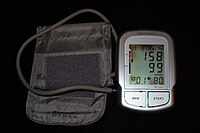
Photo from wikipedia
As the world’s population ages, the number of people over 60 years is expected to increase from 901 million to 1.4 billion by 2030 [1]. The global burden of disease… Click to show full abstract
As the world’s population ages, the number of people over 60 years is expected to increase from 901 million to 1.4 billion by 2030 [1]. The global burden of disease increases significantly with aging, and it is well established that high blood pressure is one of its leading risk factors. [2–5]. As of yet there is a relative paucity of broadly accepted effective primary prevention strategies for disability, cardiovascular disease and global disease burden [6, 7]. This is why identifying strategies that can impact their most relevant modifiable risk factors would contribute to the effort to avoid pharmacotherapeutics, an approach that has led to an increased interest in the use of food-based supplements and bioactive compounds to improve or maintain healthy body functions [8]. The Mediterranean diet (MeD), which is essentially a vegetarian regime, is generally regarded as one of the healthiest dietary patterns. It has been associated with a low incidence of cardiovascular disease, including stroke [9–13]. Indeed, vegetarian diets in general are associated with lower blood pressure [14–17] and, in this context, green leafy vegetables have been associated with a reduced incidence of nonfatal myocardial infarction, fatal coronary heart disease and stroke [18, 19]. The results of numerous studies suggest that the protective effects of the MeD and vegetarian diets are in general due to the impact of both their single components and the converging synergistic action of several components, namely of antioxidants, glucosinolates, vitamins, nitrate, and fibers. The effect of these components has been shown to reduce the traditional risk factors of atherosclerosis [20–22] as well as of oxidative stress, inflammation, and endothelial dysfunction [20, 22–25]. Nitrate-rich vegetables (leafy vegetables, crucifereae such as kale, cabbage, turnips, and beetroot), which are important components of the MeD, have been shown to improve several artery wall-related functions, in particular blood pressure, as well as clotting activity, and endothelial functions [20–25]. The data available on nitrate have prompted many investigators to examine the role of nitrate-rich vegetables in lowering high blood pressure. These trials, however, have frequently produced conflicting results. While acute studies have consistently shown a significant blood pressurelowering effect, long-term trials have frequently failed to demonstrate any effect of nitrate-rich vegetables on blood pressure. Although these conflicting results have not yet clarified the role of nitrate-rich vegetables on blood pressure, observational and prospective studies on the MeD, a diet noteworthy rich in vegetables as well as in olive oil and other active components, have consistently shown that people with high adhesion to this diet for a sufficiently long period of time, i.e.,1–4 years, have significantly lower blood pressure values with respect to people with a low adherence, an effect that has been largely attributed to the diet’s high content of vegetables [22, 23]. The DASH (Dietary Approaches to Stop Hypertension) diet, another vegetable-rich diet, has likewise been shown to keep blood pressure values lower in those who consistently adhere to it with respect to their low adherence counterparts [14, 17]. In the light of these results, it is unclear whether elderly people should consume nitrate-rich vegetables to keep their blood pressure lower. Below, some positive and negative results produced by studies investigating nitrate-rich vegetables are outlined. * Antonio Capurso [email protected]
Journal Title: Aging Clinical and Experimental Research
Year Published: 2021
Link to full text (if available)
Share on Social Media: Sign Up to like & get
recommendations!